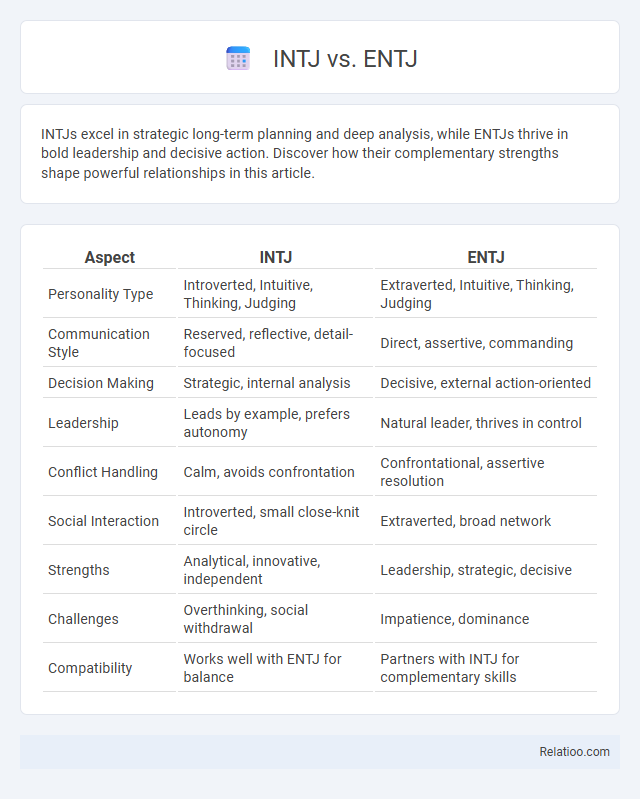INTJs excel in strategic long-term planning and deep analysis, while ENTJs thrive in bold leadership and decisive action. Discover how their complementary strengths shape powerful relationships in this article.
Table of Comparison
| Aspect | INTJ | ENTJ |
|---|---|---|
| Personality Type | Introverted, Intuitive, Thinking, Judging | Extraverted, Intuitive, Thinking, Judging |
| Communication Style | Reserved, reflective, detail-focused | Direct, assertive, commanding |
| Decision Making | Strategic, internal analysis | Decisive, external action-oriented |
| Leadership | Leads by example, prefers autonomy | Natural leader, thrives in control |
| Conflict Handling | Calm, avoids confrontation | Confrontational, assertive resolution |
| Social Interaction | Introverted, small close-knit circle | Extraverted, broad network |
| Strengths | Analytical, innovative, independent | Leadership, strategic, decisive |
| Challenges | Overthinking, social withdrawal | Impatience, dominance |
| Compatibility | Works well with ENTJ for balance | Partners with INTJ for complementary skills |
Understanding INTJ and ENTJ: Key Personality Traits
INTJ personalities exhibit strategic thinking, strong independence, and a preference for long-term planning, making them masterful problem solvers. ENTJs are natural leaders, characterized by decisiveness, assertiveness, and a focus on efficiency and organization. Understanding these key traits reveals how INTJs excel in visionary innovation while ENTJs thrive in driving execution and leadership roles.
Cognitive Functions: How INTJs and ENTJs Think
INTJs primarily use Introverted Intuition (Ni) to analyze abstract patterns and foresee future possibilities, while ENTJs lead with Extraverted Thinking (Te) to organize their environment and execute strategic plans efficiently. Your decision-making process differs as INTJs rely on internal insights and long-term vision, whereas ENTJs prioritize external logic and immediate results. Their divergent use of cognitive functions shapes how they react to challenges, with INTJs reflecting deeply and ENTJs taking assertive, action-oriented approaches.
Leadership Styles: INTJ vs ENTJ Approaches
INTJ leaders rely on strategic foresight and independent thinking to create long-term visions, focusing on efficiency and innovation while carefully analyzing data to guide decisions. ENTJ leaders emphasize assertive communication, decisive action, and motivational engagement to drive teams towards ambitious goals, often thriving in dynamic environments that require strong direction. Understanding your leadership style between INTJ's calculated planning and ENTJ's bold execution can optimize team performance and inspire goal achievement.
Communication Patterns: Differences and Similarities
INTJ and ENTJ personalities exhibit distinct communication patterns rooted in their dominant cognitive functions: INTJs use Introverted Intuition to convey abstract, strategic insights quietly and thoughtfully, while ENTJs employ Extraverted Thinking to lead discussions with decisive, goal-oriented directives. Both types value efficiency and clarity but differ in expression; INTJs prefer written or one-on-one communication to carefully craft their ideas, whereas ENTJs thrive in dynamic group settings, often using assertive verbal communication to influence and organize. Despite these differences, both INTJs and ENTJs share a preference for logical, future-focused conversations, contrasting with more emotional or spontaneous types, and their communication often drives purpose-driven outcomes.
Problem Solving: Analytical vs Decisive Methods
INTJs use analytical methods to approach problem solving, relying on deep introspection and strategic planning to identify underlying issues and develop innovative solutions. ENTJs apply decisive methods, leveraging their assertiveness and quick decision-making skills to implement practical strategies and drive results efficiently. Your problem-solving style benefits from balancing INTJ's thorough analysis with ENTJ's action-oriented mindset for optimal outcomes.
Decision-Making: Internal Logic vs External Strategy
INTJ decision-making relies on internal logic, emphasizing deep analysis and long-term vision, whereas ENTJ approaches prioritize external strategy, focusing on actionable plans and leadership in dynamic environments. Reaction patterns differ as INTJs process decisions quietly and independently, while ENTJs respond swiftly and assertively to external demands. Your ability to balance internal reasoning with external execution determines effectiveness in complex decision-making scenarios.
Social Interaction: Introversion vs Extraversion Dynamics
INTJ individuals prefer solitary reflection and deep, strategic thinking, thriving in minimal social stimulation, whereas ENTJs excel in assertive, dynamic social environments and enjoy leading group interactions. Your social style influences how you process feedback: INTJs internalize reactions for personal growth, while ENTJs actively engage and respond to maintain control in conversations. Understanding these introversion versus extraversion dynamics helps optimize communication and collaboration based on personality-driven social preferences.
Career Strengths: Best Roles for INTJ and ENTJ
INTJ individuals excel in strategic planning and complex problem-solving, making them ideal for careers in research, engineering, and systems analysis where innovation and long-term vision are crucial. ENTJ personalities thrive in leadership roles such as executive management, entrepreneurship, and project leadership due to their strong decision-making skills and natural ability to inspire teams. Understanding your unique strengths helps tailor your career path to roles that align with your cognitive preferences and leadership style.
Conflict Resolution: How INTJs and ENTJs Handle Disagreements
INTJs approach conflict resolution by analyzing the situation logically and seeking long-term solutions, prioritizing thoughtful strategy over emotional reactions. ENTJs tend to address disagreements with assertiveness and decisive action, aiming to resolve issues quickly to maintain control and efficiency. Understanding these differences can help you navigate conflicts by leveraging the INTJ's reflective problem-solving and the ENTJ's proactive leadership style.
Personal Growth Tips for INTJs and ENTJs
INTJs thrive by cultivating emotional intelligence alongside their strategic thinking, balancing introspection with proactive social engagement to enhance leadership effectiveness. ENTJs benefit from practicing patience and active listening, refining their decisiveness by considering diverse perspectives for improved team collaboration. Both personality types grow by embracing adaptability and continuous learning, turning challenges into opportunities for personal and professional development.

Infographic: INTJ vs ENTJ
 relatioo.com
relatioo.com